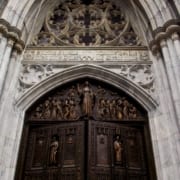Looking Deeper Before We Judge
When they kept on questioning him, he straightened up and said to them, “Let any one of you who is without sin be the first to throw a stone at her.”
John 8:7
She was an African American born in 1902 who grew up in southern Mississippi. Throughout her youth she endured segregation, learning where she could go and what she could say. It was a tough life that required her to be vigilant so as to not offend the white folks. As she approached her teen years she started to think about her future. She saw the jobs the older African American women had: most were wash maids, servants, or wives of sharecroppers. She saw them struggle to make a life. It was not the kind of life she wanted for herself.
At the age of eighteen, she gathered up what few belongings she had and walked twenty-eight miles north to the town of Natchez. It was bigger than her small, rural town—perhaps here she could fulfill her dream of a better life. She quickly found out that not much was different for an African American woman in Natchez.
The only job she could find that paid well was as a prostitute in a section of town called, “Under the Hill.” It was a tough place filled with brothels and bars and a place where people would sometimes disappear.
It was especially dangerous for a prostitute.
She learned her craft well and squirreled away a large amount of money. She also developed a clientele that included the powerful men of Natchez and the surrounding communities. By the age of twenty-three, she’d saved enough money to buy a house on Rankin street in an upper middle-class part of town.
Here she continued her trade, safe from the dangers of working on the riverfront. Over a few years, many came to the screen door in the back of her house, and she hired other workers of the night.
By 1930 she had a full-blown brothel operating in the heart of town. She would run the brothel for another sixty years.
She was clever in how she ran her business. She kept a black book containing the names of the powerful men who visited her. On Christmas, she delivered expensive liquor to the mayor, police chief, and local sheriff.
All promised to leave her alone.
She would not let black men into her brothel for fear of reprisal. Every day she had southern comfort food for her clients. She sold beer and kept a cheery house. Not only did the locals visit, but soon she became Mississippi’s most famous madam. There was an Army base nearby, and on Saturday nights, the young serviceman would line up for blocks, waiting their turn.
But there was another side to this successful and tough businessperson. She and her girls made food for the local orphanage and delivered it secretly to the back door. She gave generously to the local Catholic church.
She paid for neighborhood improvements. If a neighbor needed money for repairs, she gave it to them.
During the civil rights era, when many local blacks were arrested for peacefully protesting, she used her pull with local officials and had them released.
The FBI would visit her house early in the morning to get information about the Ku Klux Klan. Despite the danger, she told them all that she knew and was instrumental in eliminating the Klan from her community.
She had one rule that she never broke.
After one of her girls was murdered by a drunken client, she refused to serve anyone who’d been drinking. It was a rule that would ultimately cost her her life.
On July 4th of 1990, a young man appeared at her back door, belligerent and drunk. She refused him entry. He left and went to the local gas station where he filled up a canister with gasoline and then went back to her house.
This time, she came to the door with a pistol she kept for protection. The man threw gasoline on her through the screen door and lit a match. Not only did she catch on fire, but her assailant did too.
As he ran away, he looked like a running fireball.
The house caught on fire, and she stumbled to her bedroom where she collapsed with severe burns on 80 percent of her body. A young female firefighter who responded to the scene comforted her while rescue vehicles arrived. Barely alive and breathing heavily, her last moments were lived in agony.
She and her assailant both died the next day. Pastor O’Connor, the priest from the nearby Catholic church offered to arrange her funeral. It was the same church that she had helped many times over the previous sixty years.
During the next week, some of the parishioners complained bitterly about their church being used for a madam’s funeral. Despite this, the following Sunday, Pastor O’Connor delivered a fire and brimstone sermon about judging others. He quoted the above verse from John 8:7. It is the story of a woman who was stoned for leading a life as a prostitute. When Jesus arrived, he asked the crowd to only cast a stone if they had never sinned. As we all know, the crowd disbanded.
The woman’s name was Nellie Jackson, and you won’t find a Wikipedia page about her. But if you google her name, you can read her story from newspaper accounts, and in 2017, a local produced a documentary called Mississippi Madam.
If you watch it, you will discover that she attended many World Series—the last one in 1984 in Detroit. Her tickets were given to her by Bill Harrah—yes, the man who started the Harrah casinos.
Nellie was befriended and beloved by many.
Not because she ran a brothel but because she gave to her community. She was a person who listened to those that needed comfort. Those who worked for her loved her, and so did her clients.
I don’t write this to support brothels or to glamorize prostitution. I write it to tell a story about a woman who did the best she could when society tried to keep her in a box. Could she have become a doctor and saved lives? Could she have become a great stateswoman and fought for democracy? Maybe, but given her background it’s unlikely.
Jesus defended the prostitute because he knew one thing—we all fail. Ours is not to judge but to pray for understanding. Ours is not to hate, but to love. We are all made in the image of God.
Blessings, until next time,
Bruce L. Hartman
Dr. Bruce L. Hartman is the author of Jesus & Co. and Your Faith Has Made You Well.










